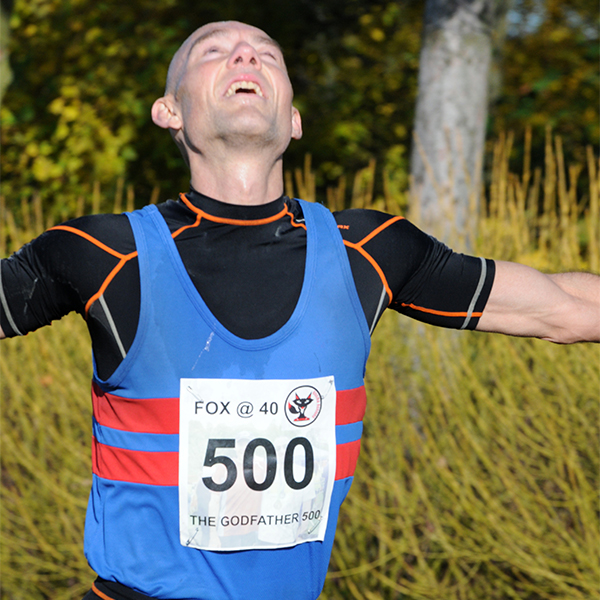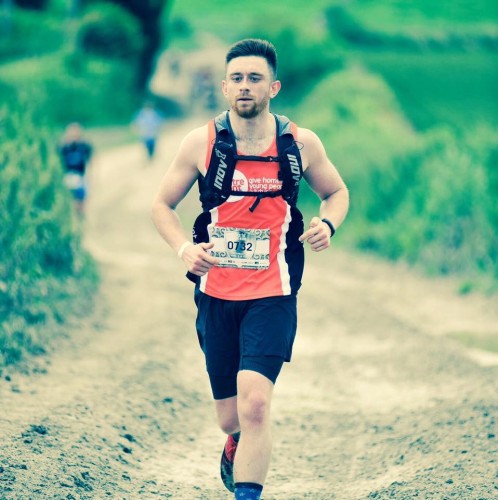In 2012, multi-marathon man Steve Edwards reached his goal of running an astonishing 500 marathons in under 3hrs 30mins. Not content with what, for most of us, is an inconceivable achievement, he’s now looking to chase down 1,000. We caught up with the ordinary bloke-turned world record holder: a man for whom running has provided the chance to create a legacy.
Q. So Steve, when did you start running?
A. When I was at school, I ran the shorter distances – 400m and 800m – but absolutely hated anything longer. Then, when I was 18, on the back of a few 5 mile runs, I decided to run the Coventry marathon. It was fine until 15 miles in, when the wheels really did come off. I could barely walk for weeks afterwards!
Q. How good do you think you could have been, if you had started earlier?
A. It’s hard to say, but a coach once told me that he thought I had the potential to run 2:30-2:35 with the right training. I knew that wouldn’t win me a major marathon though, so I decided to go for a balance of quality and quantity to try and set new records in that area.
Q. What possessed you to want to run 500 marathons? How did that idea come about?
A. I was inspired by Sy Mah’s record of 524 in 3:30-3:40 finish times and thought to myself, “hang on, I could do better than that”. As I raced more and more, my confidence grew and what was a bit of a pipe dream became a definite, achievable goal.
Q. Once you started, did you ever have any doubts?
A. Not in my early years; I behaved as if I was unbreakable. As I’ve got older, though, there’s the occasional odd moment, especially if I’ve picked up an injury, where I wonder if that could be it. Having said that, I’ve become much more in tune with my body and I’m more aware of the risks of over training.
Q. Is there a single race that stands out as the toughest?
A. Yes! The Swiss Alpine Ultra Marathon in 1991. I broke a bone in my foot mid-race and the last 10 miles were absolute agony. Also, any multi-day event is tough. Especially when you’re not just looking to complete it, but actually trying to race that marathon distance, day after day.
Q. And how far in to the 1000-marathon challenge are you now?
A. I’ve run 670 marathons, of which 593 are sub-3:30 and 290 are sub-3:15. The aim is to hit 600 sub-3:30s on 29th March.
Q. Do you find it difficult to balance the running with work and life at home?
A. It’s obviously difficult to balance family, chores, work and the planning of events, with the actual running, but I try to fit exercise in to day-to-day life. For instance, I cycle to work, run at lunch and do core work and weights in the evenings.
Q. What does your training schedule involve?
A. Training runs, six days a week, and a marathon most weekends. I do core work four days a week and weights once or twice.
Q. How do you stay motivated?
A. I won’t lie, it is getting more difficult as time goes on, but setting shorter term goals is key. I stay focused on the shorter goals (running so many under 3:15, 3:20, 3:30 e.t.c) and also run each race as if it was my last. The charity side of things helps a lot too: when people are depending on me to deliver, it spurs me on.
Q. You must be immensely proud of your achievement?
A. Hugely. Every now and then, I stop and think of how unique my life is. I really am just an ordinary bloke, but I’ve managed to do something that no one else in the world has ever done.
Q. How much training, would you say, a beginner should put in before running their first marathon?
A. Little and often. Also, don’t just run on the road: hit the trail to ease pressure on the joints. Fundamentally, though, do cross-training! Core work, weights and plyometrics have been essential for me. When I was younger, I did martial arts and played a lot of football, which – although I didn’t realise at the time – prepared my body for what it’s been able to do now.
Q. What’s your favourite pre-race meal?
A. Any pasta dish or pizza. Carbs, carbs and more carbs!
Q. Do you place much importance on nutrition?
A. Absolutely. Aside from eating lots of fruit, veg and protein, I also take a few supplements. I’m lucky enough to be sponsored by Mannatech and Team Nutrition, who supply me with real food supplements and carbo-loading, recovery drinks, respectively. I think good nutrition is invaluable for not only race preparation, but also recovery and ensuring longevity in the sport.
Q. What’s the main piece of advice you would share with wannabe-marathon-runners?
A. Unfortunately, there are no short cuts. Put in the hard work and you will be rewarded. Running, like nothing else, is all about getting out what you put in. Having said that, it’s important not to do too much too soon, as strength and durability is built up over months and years, not weeks.
Q. And finally Steve, on a lazy day (if there is such a thing) what do you do?
A. They’re few and far between, but you can’t beat putting your feet up on the couch, eating chocolate and watching a film.







